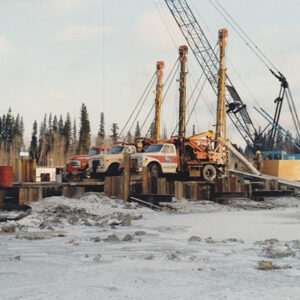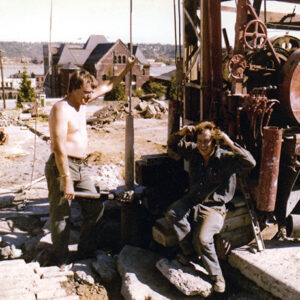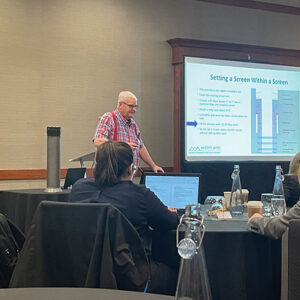
Features
Associations
A milestone celebration for the British Columbia Ground Water Association
BCGWA is 30 years old, but it’s really 23 years older
June 30, 2023 By James Careless
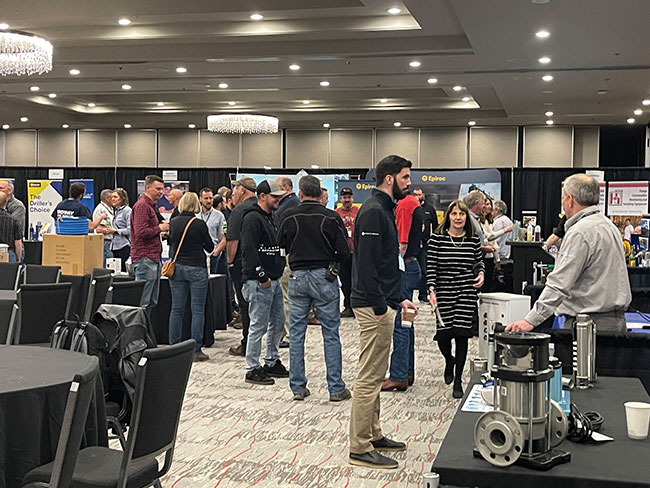 The annual
convention of the British Columbia Ground Water Association was well attended in 2023 in Penticton.
Photo credit: BCGWA
The annual
convention of the British Columbia Ground Water Association was well attended in 2023 in Penticton.
Photo credit: BCGWA The year 2023 marks the 30th anniversary for the British Columbia Ground Water Association (BCGWA)… sort of. Although the BCGWA officially came into being on March 6, 1993, its direct predecessor was founded on June 17, 1970.
This is when the British Columbia Water Well Drilling Association (BCWWDA) was created during a meeting at the Villa Hotel in Burnaby, B.C, which was attended by 26 people.
According to an article written by first BCWWDA president Laurie J. Desilets (‘How the Association Came into Being’), the impetus for creating this association was a move by the B.C. government to regulate the B.C. well drilling industry.
“Government really did us a favour by introducing Bill 43 into the legislature in the spring of 1970 which stated that no wells would be drilled in B.C. without first obtaining a permit,” he wrote. “Well drillers all over the province were furious, how dare government intrude on our freedom to ply our trade which we had enjoyed for so many years.”
A tight focus
The enthusiasm that drove the BCWWDA’s founding meeting can be attributed to the meeting’s guest speaker ,Jay Lehr, who was the executive secretary of the National Water Well Association (U.S.). “Jay addressed the gathering and congratulated all those present for showing an interest in establishing an association because it is the most effective way we know of, of finding solutions to common problems,” wrote Desilets. “He went on to explain that a strong association with active members gave us an effective voice in shaping legislation by government that affect the well-being of the drilling industry in British Columbia.”
The audience, which had sat in “strong silence” before Lehr spoke, was energized into action afterwards.
“After his address, the ‘British Columbia Water Well Drilling Association’ name was chosen, and an executive and a director for four regions were elected,” Desilets wrote. Led by him, this leadership group wrote a constitution and bylaws for the BCWWDA, and had the association registered officially with the B.C. government. After this was done, “the next big hurdle was organizing our first convention and, with the unceasing help from our wives, we organized and held our first convention at the Astor Hotel in Burnaby. It was a success with about 130 men and their wives (no girlfriends in those days) attended and we were all impressed.”
Ron Nelson is a pump installer/well driller with Precision Service & Pumps in Abbotsford, B.C., and a long-time BCGWA member. “I have been active in the BCGWA for about 20 years serving on the executive as secretary for most of that time, although my indirect involvement goes back much further,” he said. “My father was one of the charter members and was heavily involved in the establishment of what originally began as the BCWWDA. My mother was the organizer, accountant, newsletter editor and secretary for a couple of decades after.”
Nelson can recall the BCWWDA’s first convention, which took place in 1971 in Burnaby. “It included talks like ‘The Association and You’, ‘Groundwater in the ‘70s’, and ‘Hole Economics of Cable Tool Drilling’,” he said. “It was a very formal affair, with the men all in suits and the women in gowns — spouses only, no unmarried couples! I recall my father decided that he had to purchase a suit and tie now. He borrowed a suit for his wedding.”
In subsequent years, the men tended to dress down for the annual BCWWDA convention while “the ladies generally still dressed up; it might have been the most extravagant night of the year for many,” said Nelson. “There came to be a bit of competition over whose wife had the most money wrapped up in jewelry, the definitive sign of the most successful driller. Meanwhile, we had plenty of exhibitors at the convention. I always looked forward to what was in the bag of swag that Dad would bring home for myself and siblings to fight over.”
Making friends and swapping stories were just as important to these BCWWDA conventions as attending educational sessions and doing association business. “There was always plenty of opportunity to share ‘drink and tell’ driller stories after the sessions were done,” Nelson said. “There were numerous examples to learn from; mostly on how to exaggerate, be it fishing for salmon or fishing for lost drill bits — always blame that useless helper for losing the drill string.”
At the same, the BCWWDA was serious about protecting and advancing the industry’s interests in B.C., while ensuring that all members, big or small, had a say in this process. “From the start, the association always followed a ‘one company equals one vote’ policy, regardless of how many employees or drill rigs were involved,” said Nelson. “Pacific Water Well (Nelson’s dad) was one of the largest, and he ensured this rule was implemented so he or any other single company couldn’t dominate a discussion and vote against the better interests of the owner/operators that formed the majority. That rule applies to this day.”
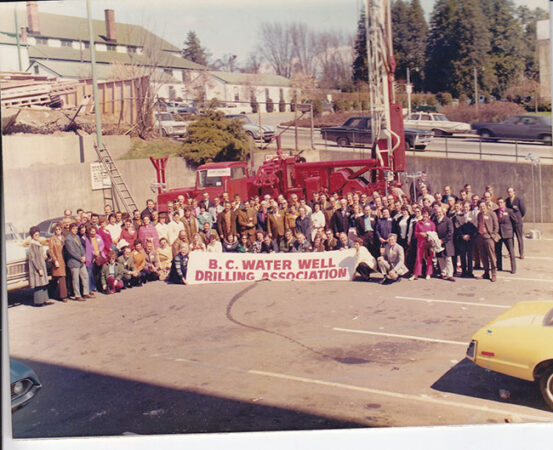
Members of the previously named B.C. Water Well Drilling Association gather for a group photo in the 1970s.
Photo credit: Courtesy Ron Nelson
From then until now
“At the annual general meeting on March 6th, 1993 it was voted to change the name of the association to: The British Columbia Ground Water Association as it was felt this more accurately described the objectives of the Association,” wrote Laurie Desilets.
The move made sense: “Over the years the BCWWDA’s membership had expanded beyond well drillers to encompass the entire provincial groundwater industry,” said Dave Mercer, the BCGWA’s current general manager. “The association and its members wanted to reflect this fact in their name and focus. We’ve gone from just representing a specific trade to actually all working together to protect and sustainably develop groundwater.” At present, the BCGWA has approximately 230 corporate members; far more than the 26 who founded the BCWWDA.
From then until now, the BCGWA has faced many industry challenges as it developed and promoted groundwater best practices. The association also did its best to help forestall tragedies like the e-Coli contamination of the Walkerton, Ont. potable water supply, which killed seven people in 2000. “In British Columbia, the BCGWA helped the provincial government establish what the protocols should be for completing the surface of every water well drilled here to keep this from happening,” said Mercer.
The association has dealt with many other issues over the years. For instance, when Kathy Tixier took over from BCGWA general manager Bruce Ingimundson in 2015, “we were still reeling from the demise of the Canadian Groundwater Association in 2013 because the CGWA had been the only certifying authority for our new drillers and well pump installers in our province,” she said.
That’s not all: “The new Water Sustainability Act was on the cusp of being made law, and many were anxious about how the licensing of groundwater could impact the groundwater industry and groundwater users,” said Tixier, who served as GM until 2018. “The infamous Beechwood flowing well was drilled in September of 2015, which was a ‘wake-up call’ about the financial liability associated with unexpected flowing artesian conditions. (According to a March 10, 2016 story in The Province newspaper, ‘An unlicensed and unqualified well driller who tapped into a pressurized aquifer in southwest Vancouver last year triggered an uncontrolled flood of water that is threatening as many as a dozen multi-million-dollar homes.’) It was an exciting time, but fortunately I had a cohesive, energetic team who were willing to guide me along the way.”
Mercer succeeded Tixier as BCGWA GM. Today, he and the association have a lot on their plates. This includes working with the provincial government to finetune its groundwater licensing regulations, which defines how and where wells can be dug and how much water can be extracted. The BCGWA also surveys its members regularly to stay on top of their changing needs and inform its industry advocacy efforts, and promotes the groundwater industry as a viable career choice for young people through the BCGWA Hydrogeology Award scholarship and other outreach initiatives.
As for certifying groundwater technicians in B.C., now that the CGWA has once again gone defunct: “Fortunately, drilling and water pump installation have been recognized as legitimate trades in B.C., with certificate of qualifications being issued by the province’s SkilledTradesBC agency,” said Mercer. “BCGWA helps SkilledTradesBC in vetting applications submitted by those wishing to take the SkilledTradesBC certification exams..”
All told, the BCGWA is as busy, engaged and relevant today as the BCWWDA was when it began in 1970. “We have clout,” Mercer said. “We can get audiences with provincial cabinet ministers. There’s definitely strength in the association and what we have to say. The journey that the BCWWDA started 53 years ago continues today with the BCGWA.”
Print this page
